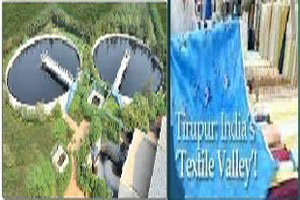
Gujarat aided CETP to help Tirupur textile units become eco friendly
YarnsandFibers News Bureau 2017-08-16 14:00:00 – ChennaiScientists of Gujarat-based Central Salt and Marine Chemicals Research Institute (CSIR-CSMCRI) have helped textile processing units of Tirupur, India’s textile valley set up the State’s first common effluent treatment plant (CETP) in Chinnakarai making Tirupur textile dyeing units environmentally sustainable and achieve zero liquid discharge.
CETP will separate sodium chloride and sodium sulphate from solid residue. Over the years, the solid residue from the textile units has piled up to the extent of 6,000 tons and is going to landfills posing a major environmental hazard.
The Tirupur textile dyeing units and surrounding districts have been facing heat for polluting the environment and the Madras High Court in 2011 ordered closure of all units which violated pollution norms and asked the units to achieve zero liquid discharge.
The region has over 600 textile processing industries and several common effluent treatment plants (CETP) are operating to manage the waste water discharged from these industries.
Amitava Das, the director, CSMCRI, said that waste water (effluent) generated from textile processing contains sodium chloride and sodium sulphate as a major contaminant. After primary and secondary treatment, the high TDS (total dissolved solid) effluent is processed for recovering and recycling the water back to the industries and the associated solid residue was used for land filling.
The Dyers Association of Tirupur (DAT) approached CSMCRI and they developed the process for separation of sodium chloride and sodium sulphate in useable purity based on differential solubility behaviour and demonstrated the process successfully in the laboratory as well as in pilot plant.
Subsequently, a commercial scale project for separation and recovery of sodium chloride and sodium sulphate from textile processing effluents based on CSMCRI technology know-how has been set up.
Since both of these salts are already needed for textile processing, albeit in pure form, the thought was originated by Chinnakarai CETP in association with Tamil Nadu Water Investment Company Limited (TWICL) to separate and reuse the same.
The plant is in pre-commissioning stage with the Upgradation process completed will be operational in a week’s time.
Since 2000, textile units are partly meeting their requirement of sodium sulphate by recovering the same through adiabatic crystallization system, implemented by M/s Chemprocess Systems P. Ltd, (CPSPL).
Market Intelligence
Ask for free sample Report

experience
Customer Base
dedicated team
Countries Served Worldwide









